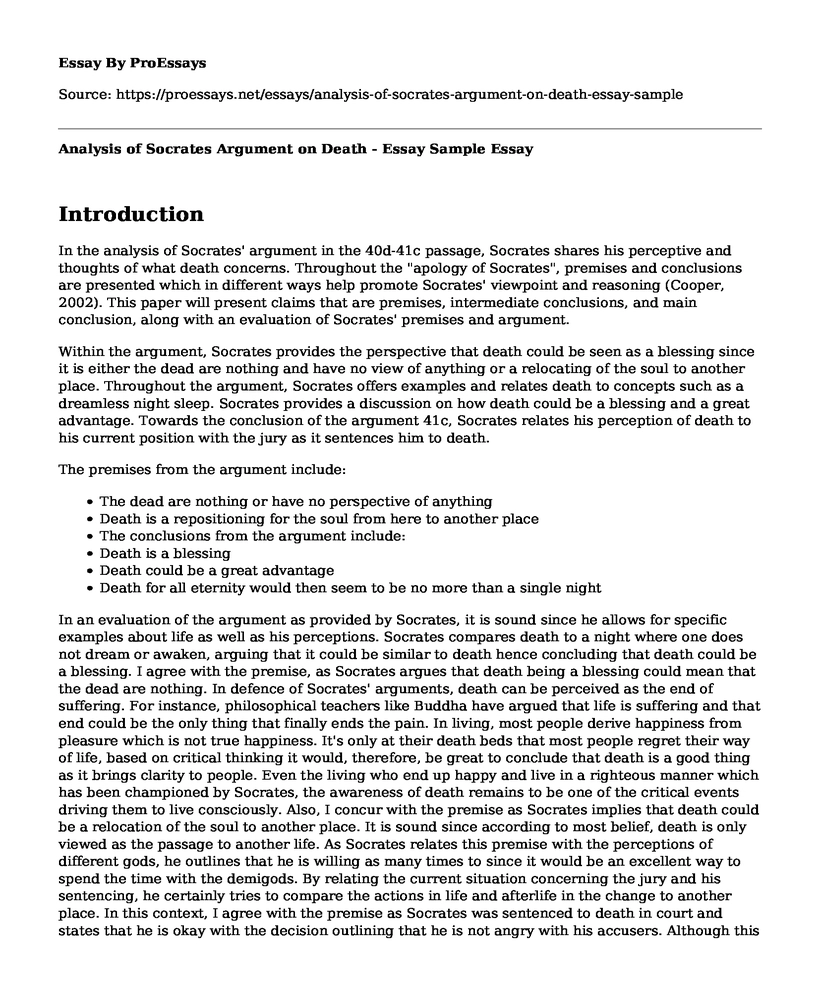Introduction
In the analysis of Socrates' argument in the 40d-41c passage, Socrates shares his perceptive and thoughts of what death concerns. Throughout the "apology of Socrates", premises and conclusions are presented which in different ways help promote Socrates' viewpoint and reasoning (Cooper, 2002). This paper will present claims that are premises, intermediate conclusions, and main conclusion, along with an evaluation of Socrates' premises and argument.
Within the argument, Socrates provides the perspective that death could be seen as a blessing since it is either the dead are nothing and have no view of anything or a relocating of the soul to another place. Throughout the argument, Socrates offers examples and relates death to concepts such as a dreamless night sleep. Socrates provides a discussion on how death could be a blessing and a great advantage. Towards the conclusion of the argument 41c, Socrates relates his perception of death to his current position with the jury as it sentences him to death.
The premises from the argument include:
- The dead are nothing or have no perspective of anything
- Death is a repositioning for the soul from here to another place
- The conclusions from the argument include:
- Death is a blessing
- Death could be a great advantage
- Death for all eternity would then seem to be no more than a single night
In an evaluation of the argument as provided by Socrates, it is sound since he allows for specific examples about life as well as his perceptions. Socrates compares death to a night where one does not dream or awaken, arguing that it could be similar to death hence concluding that death could be a blessing. I agree with the premise, as Socrates argues that death being a blessing could mean that the dead are nothing. In defence of Socrates' arguments, death can be perceived as the end of suffering. For instance, philosophical teachers like Buddha have argued that life is suffering and that end could be the only thing that finally ends the pain. In living, most people derive happiness from pleasure which is not true happiness. It's only at their death beds that most people regret their way of life, based on critical thinking it would, therefore, be great to conclude that death is a good thing as it brings clarity to people. Even the living who end up happy and live in a righteous manner which has been championed by Socrates, the awareness of death remains to be one of the critical events driving them to live consciously. Also, I concur with the premise as Socrates implies that death could be a relocation of the soul to another place. It is sound since according to most belief, death is only viewed as the passage to another life. As Socrates relates this premise with the perceptions of different gods, he outlines that he is willing as many times to since it would be an excellent way to spend the time with the demigods. By relating the current situation concerning the jury and his sentencing, he certainly tries to compare the actions in life and afterlife in the change to another place. In this context, I agree with the premise as Socrates was sentenced to death in court and states that he is okay with the decision outlining that he is not angry with his accusers. Although this is wrong, in my opinion, based on human rights, Socrates is only trying to do what is right holding the belief that death could be a great advantage.
References
Cooper, J. M. (2002). Plato: Five dialogues: euthyphro, apology, crito, meno, phaedo. Hackett Publishing.
Cite this page
Analysis of Socrates Argument on Death - Essay Sample. (2023, Mar 29). Retrieved from https://proessays.net/essays/analysis-of-socrates-argument-on-death-essay-sample
If you are the original author of this essay and no longer wish to have it published on the ProEssays website, please click below to request its removal:
- Friedrich Nietzsche Biography
- Hobbes and Aristotle on Whether State Laws are Unjust Essay
- Ethics Issues in Social Media Research
- Philosophical Considerations on the Future of Artificial Intelligence Essay
- Essay Example on Ethics for Life
- Paper Example on People's Identity Construction on Social Media Platforms
- Essay Example on Essential Life Knowledge: Don't Neglect or Risk Dire Consequences







